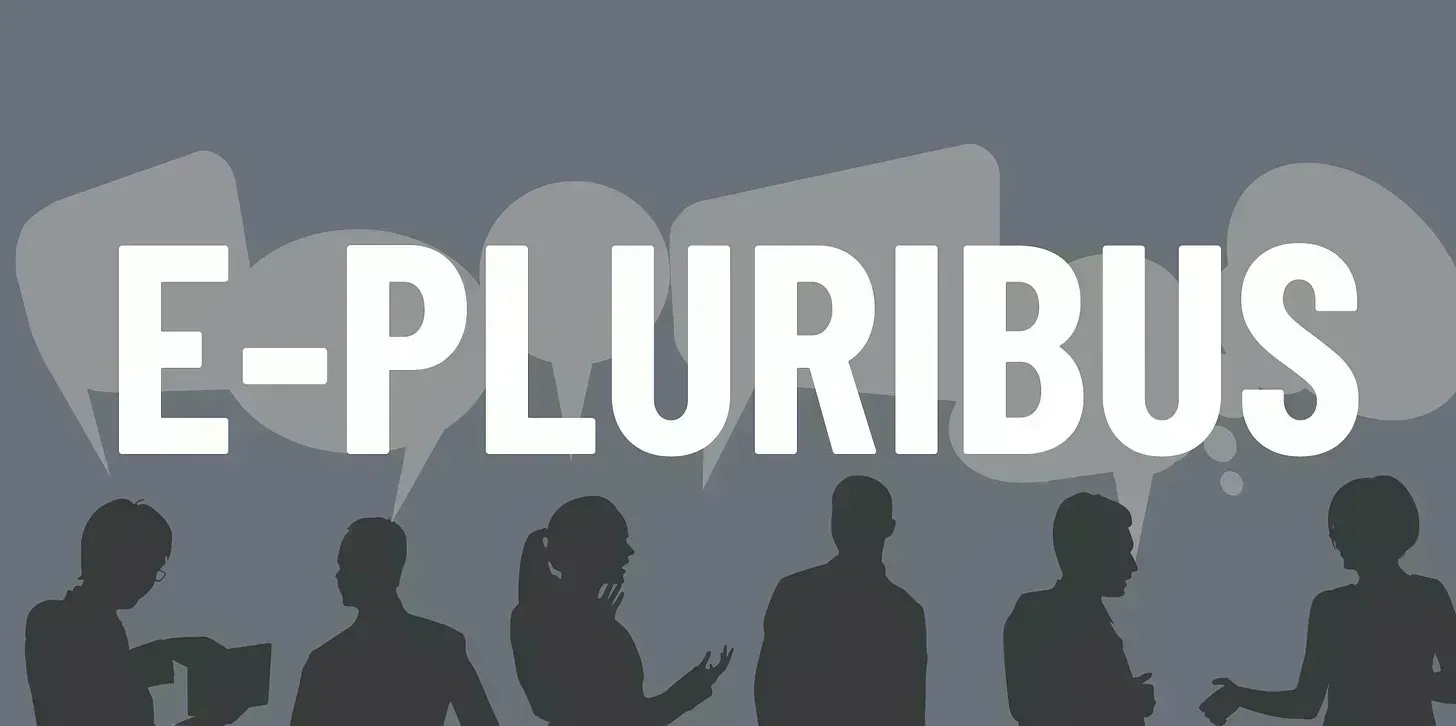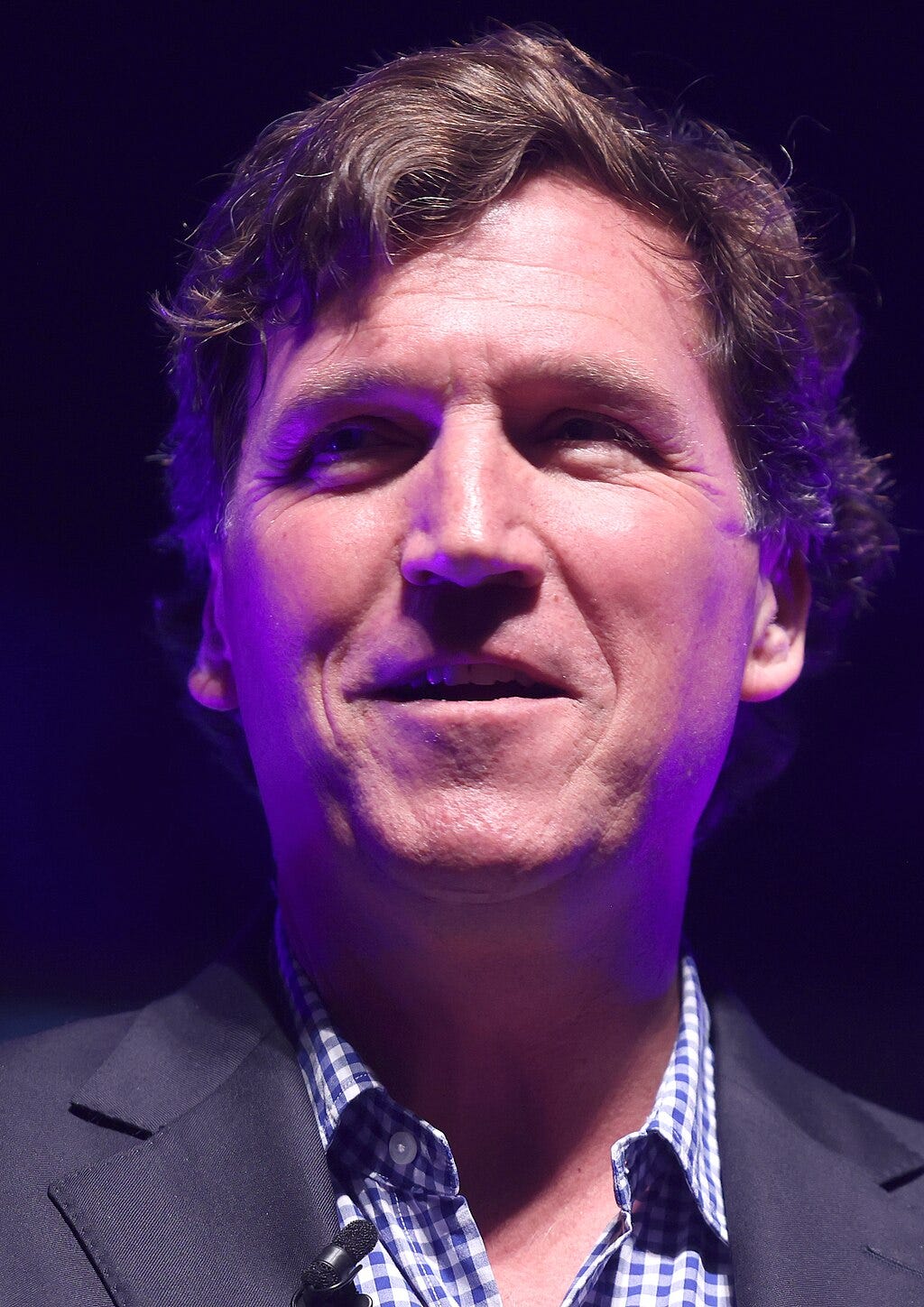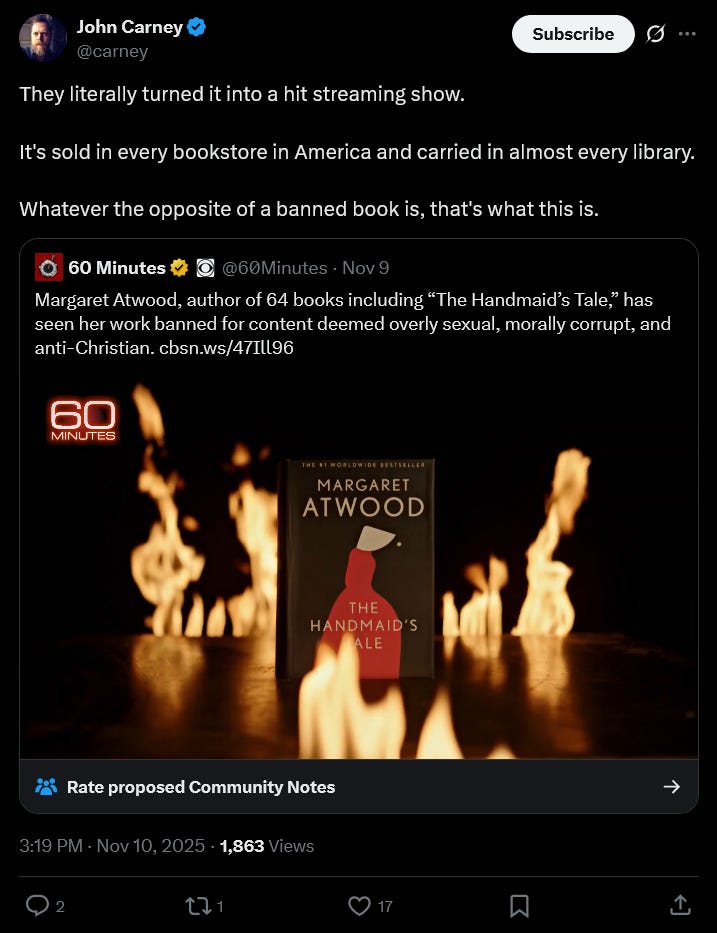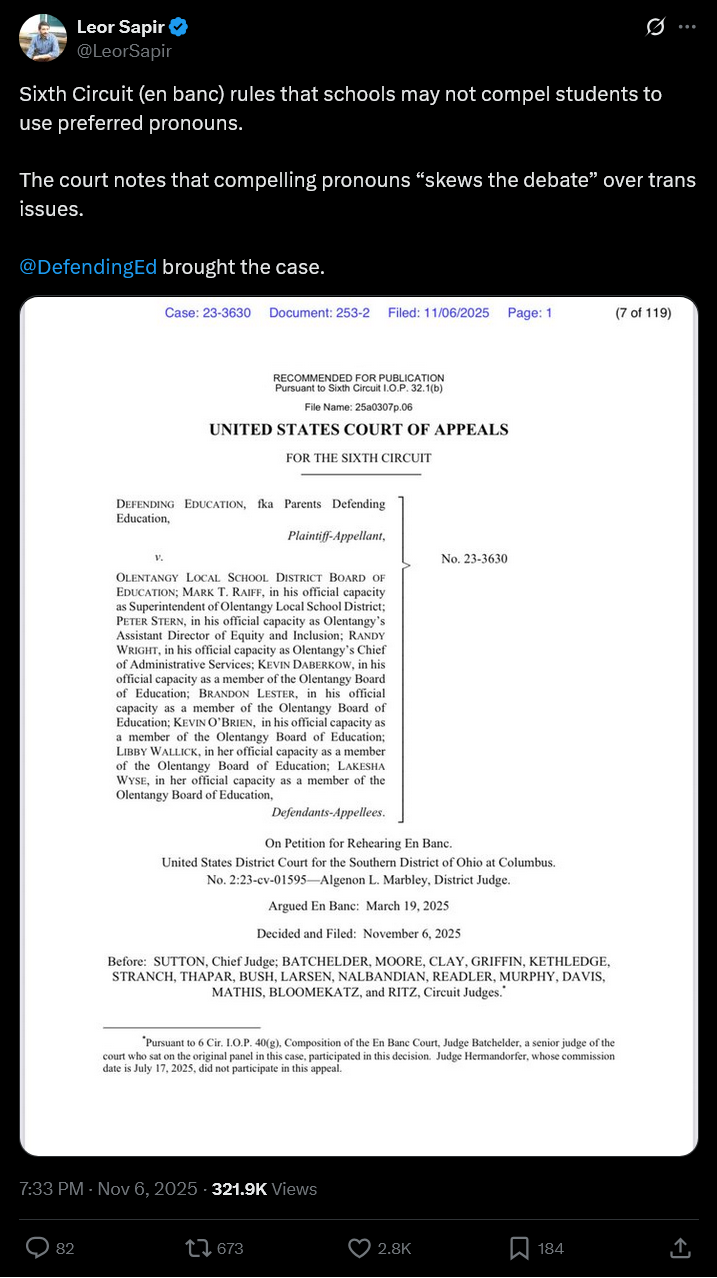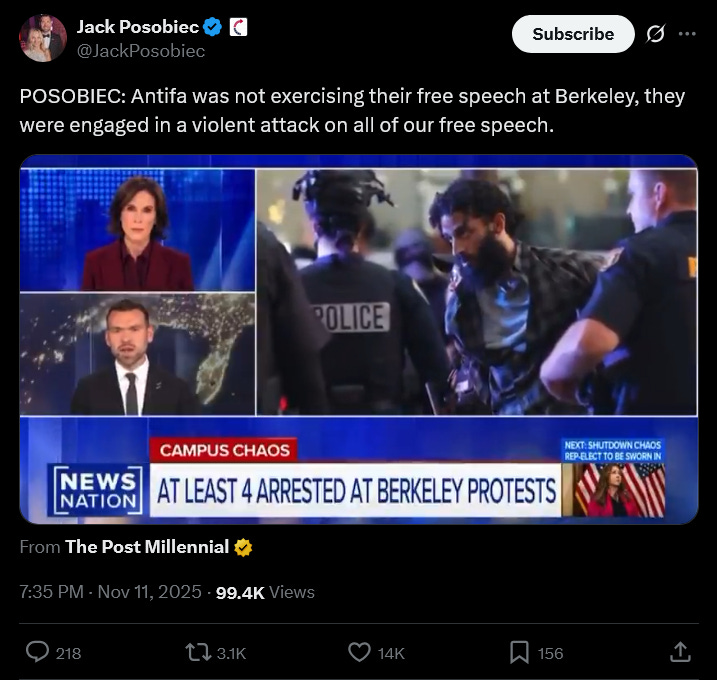E-Pluribus | November 12, 2025
America's 'schizo-politics.' Tucker can't be canceled. Cambridge (barely) protects a philosopher's free speech.
A round-up of the latest and best insight on the rise of illiberalism in the public discourse:
Christopher Rufo: The Rise of American Schizo-Politics
The open exchange of ideas is the antidote to political violence. But we’re increasingly unwilling to engage people we disagree with because the online political landscape caters to our worst partisan impulses. Chris Rufo calls this phenomenon “digitally driven schizo-politics” over at City Journal:
We seem to be entering a period of digitally driven “schizo-politics,” in which both sides’ fringes have developed a web of political narratives, conspiracies, and counter-conspiracies. On one side, we have the left-wing terror memeplex, optimized toward radicalization and random acts of violence. On the other side, we have a paranoid right-wing variant, which refuses to accept reality—“maybe we didn’t really land on the moon”—and directs a growing segment of the population down rabbit holes.
The rise of American schizo-politics is a sociological problem, but it’s also a technological one. The nature of the Internet changes how narratives move through society and tap into the population’s psychological weaknesses and temptations. On the left, this phenomenon creates real physical danger, motivating the most disturbed nodes in the network to commit acts of violence.
On the right, conspiracy theorists offer a sense of control, certainty, and meaning to those who lack it, stitching together seemingly random and chaotic events into a coherent narrative, but ultimately separating their audience from reality and undermining the Right’s ability to maintain political discipline—something Charlie Kirk once managed effectively.
Scott Greer: You Can’t Purge Tucker
In decades past, losing your newspaper column or cable talk show—being “canceled,” as we now call it—was the end of your career. Things are different today thanks to social media. The internet has enabled political commentators to reach their audiences whether the powers that be like it or not. Scott Greer cites Tucker Carlson as the textbook example:
These [social media] platforms are not as censorious as they once were, which allows “canceled” figures to thrive. Voices that would’ve been marginalized in the past can now do their own thing free of the oversight of the old guard.
Tucker Carlson has done this. He became the most important conservative commentator thanks to his primetime Fox News show. His influence stemmed from this institutional base. When Fox cast him out in 2023, some thought he would become irrelevant. That’s what happened to Bill O’Reilly when he was fired by the network in 2017. Carlson, unlike O’Reilly, was able to overcome this setback. The new media environment provided him with plenty of platforms to retain and even grow his large audience and maintain his influence on the right. His talent and insight didn’t disappear after his ouster from Fox News. Thus, he was able to remain a prominent voice on the right.
His podcast is the second-most popular on Spotify. His videos regularly get over a million views on YouTube. (His Fuentes interview currently has over five million views.) He gets far more viewers on these platforms than his nemesis, Ben Shapiro. Reporters and commentators regularly follow Carlson’s podcast and care about what he says. The president and vice president of the United States are often asked about Carlson’s views, demonstrating his large influence.
As long as Carlson remains on Spotify, YouTube, and X, the conservative movement can’t cast him aside. He still has his millions of listeners, and those fans don’t seem swayed by Mark Levin’s hysterical attacks. The only way to purge Carlson is to pressure these platforms to cancel him. A few years ago, this was a likely scenario. The tech giants were happy to censor anyone accused of wrongthink. But it’s a new era.
These platforms, especially X, are eager to prove their free speech bona fides. Even YouTube, which was a horrific censor during peak woke, now wants to look like it supports free expression. Big Tech still leaves a lot to be desired in this area, but it operates much better than it did at the height of the Biden administration. Spotify is not going to kick off its second-most popular show just because Mark Levin and Ben Shapiro are upset.
Abhishek Saha: A Heretic Reprieved
Last month, the University of Cambridge dismissed 58 student complaints against philosopher Nathan Cofnas, marking the first major test of its new Code of Practice on Freedom of Speech and the UK’s Higher Education (Freedom of Speech) Act. Cofnas sparked outrage with a blog post about genetic influence on racial differences in IQ.
Despite a petition with over 1,000 signatures demanding his dismissal, the university (ultimately, with a little prodding) upheld his right to express controversial views. As Abhishek Saha writes at Quillette, Cambridge’s decision to retain Cofnas reaffirms that academic freedom is most vital when speech is offensive or unpopular:
Cambridge’s promise to protect lawful speech has now been tested. Earlier this month, it was reported that the university had dismissed all 58 student complaints alleging that philosopher Nathan Cofnas’s views amounted to discrimination or harassment. The decision is the first substantive application of Cambridge’s new Code of Practice on Freedom of Speech and an early measure of the Higher Education (Freedom of Speech) Act’s reach.
Cofnas has drawn controversy for years. In 2020, he published a defence of free inquiry on taboo topics in a respected philosophy journal and a number of philosophers promptly mounted a campaign against him. When he arrived at Cambridge in 2022 as a Leverhulme Fellow in the faculty of philosophy, cancellation attempts followed almost immediately. But his latest troubles began in February 2024, when he published an essay titled “A Guide for the Hereditarian Revolution” on his personal blog. Students launched a petition calling for Cofnas to be dismissed, which swiftly gathered over 1,000—mostly anonymous—signatures.
…
Under pressure from students and some staff, both the university and the college effectively reversed their commitments to free speech made only weeks earlier. Vira told a faculty meeting with students that there had been “failures” in the process of appointing Cofnas. Homerton principal Lord Simon Woolley urged that Cofnas be dismissed for gross misconduct, telling a hastily convened town hall at Emmanuel College: “I see it for what it is. Abhorrent racism, masquerading as pseudo-intellect.” Following formal complaints by students, investigations were opened by both the university and Emmanuel College.
…
While the Cambridge drama unfolded, a hero was advancing on the regulatory frontier. The Higher Education (Freedom of Speech) Act, passed in May 2023, was due to come into force on 1 August 2024.
The Act required universities and constituent colleges to take all “reasonably practicable” steps to secure lawful free speech and academic freedom, maintain and follow a Code of Practice for Free Speech, and actively promote the importance of free speech and academic freedom. It also established a director for freedom of speech and academic freedom on the board of the Office for Students (OfS)—England’s higher-education regulator—empowered to run a cost-free complaints scheme and recommend sanctions for breaches of free-speech duties. Soon after the bill’s passage, the Government appointed Arif Ahmed, a Cambridge philosophy professor and prominent defender of academic freedom, as the first director.
…
Nevertheless, the dismissal of student complaints against Cofnas now stands as a precedent at a leading UK university: frank discussion of this topic—including advocacy of the hereditarian hypothesis and exploration of its moral and political implications—is protected by its code of practice on free speech.
Around X
John Carney highlights the absurdity of describing an international bestseller turned hit streaming series as a “banned” book.
The Sixth Circuit stands up for student free speech.
Jack Posobiec with a helpful reminder: protests are legally protected speech; violence masquerading as protest is a crime.



